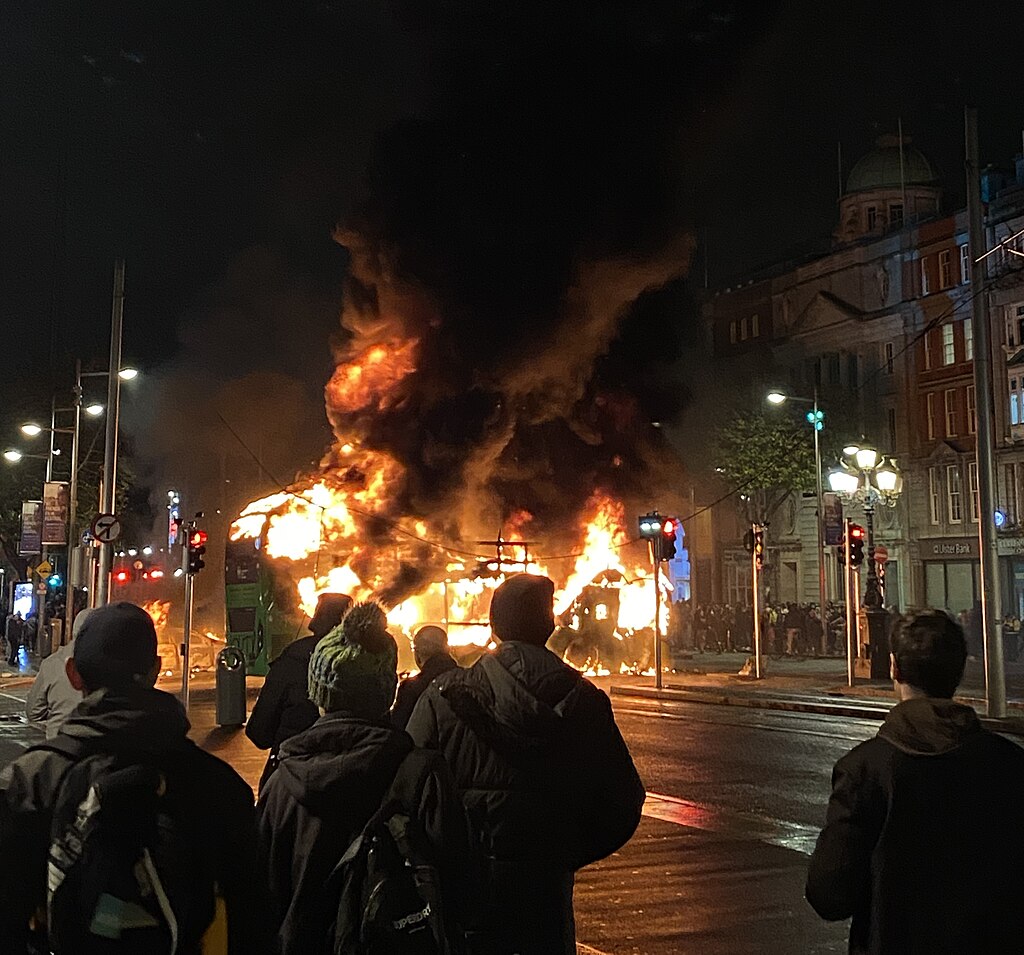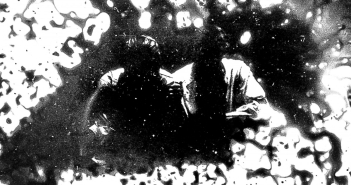When David Irving, the mad fascist historian imprisoned in Austria for Holocaust denial, was asked to speak by The University Philosophical Society in Dublin in the late 1980’s, the Student Union – involving the current Labour leader Ivana Bacik – instigated a protest that led to a minor riot to prevent him from speaking.
Given the criminal damage, which included broken windows, it’s miraculous no one was badly hurt. Having stormed the Bastille, they tried to track down Mr. Irving, who, bizarrely, had taken refuge in The Dracula Museum at the very top of the building. In the meantime, I, and others, witnessed him with a load of maps of Concentration Camps on the floor in front of him, in near darkness, insisting it could not have happened. I left the building.
As the events unfolded, I was asked to speak to the chamber and suggested that a much better course of action would have been to allow Irving to speak and then heckle and destroy.
I should add that my original advice that he should not have been invited had been ignored.
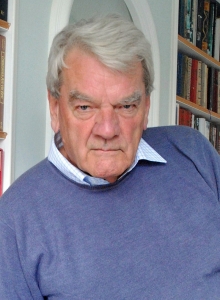
David Irving.
Guilt and Attribution
I am loathe to agree with Mr. Varadkar about anything but I can’t help agreeing that the events in Dublin’s fair city on the 23rd of November disgraced Ireland. The question of course is the attribution of blame and responsibility. The Moral ledger. Guilt and attribution.
Before initiating new legislation, I believe Varadkar and his government should read Albert Camus’s The Rebel on the subject of extremism, and how a reign of terror begins. How do we identify in advance the sans culottes?
Here today we see a potential terror, but a terror by whom and for what purposes? And how does the state not become part of the problem – as an ancien regime adopting draconian laws that foment terror in response? How do we prevent the creation of a police state purporting to prevent anarchy?
The far right is a product of neo-liberal Ireland, state authoritarianism and surveillance, and the conduct of our thuggish professional and business classes. The people rioting are Leo’s Picture of Dorian Gray: the generation he inherited as Taoiseach; and let us not forget the earlier, inconsequential, insurrectionist protest outside the gates of the Oireachtas. It wasn’t exactly The Boston Tea Party or the Trumpian storm on the White House, but a worrying indication of the shape of things to come.
Though the numbers are small in Ireland now, the movement is trending with over one-third of Europeans endorsing far right-wing parties. And now the proto-fascist Geert Wilders has emerged as the main victor in the Dutch election; while in Italy far right Prime Minister Giorgia Meloni prosecutes the legendary Italian journalist Roberto Saviano, who had the temerity to describe her as a bastard over her immigration policies.
Leo Varadkar ought to understand, as Mr Saviona does, that crony capitalism and drug cartels exhibit similar features. The drug cartels, subversion and gangsterism of the inner-city rioting often finds a reflection in the mendacious and buccaneering conduct of the commercial classes. Varadkar’s government cannot wash its hands of responsibility of the causes of the Promethean storm.
Moreover, irresponsible comments by Mary Lou McDonald that Drew Harris should resign betray a complete lack of empathy with the injured, some seriously, rank and file Garda officers. Whatever I think of the police as an organization – which is not much – the timing of remarks such as these was unacceptable, and in context offensive.
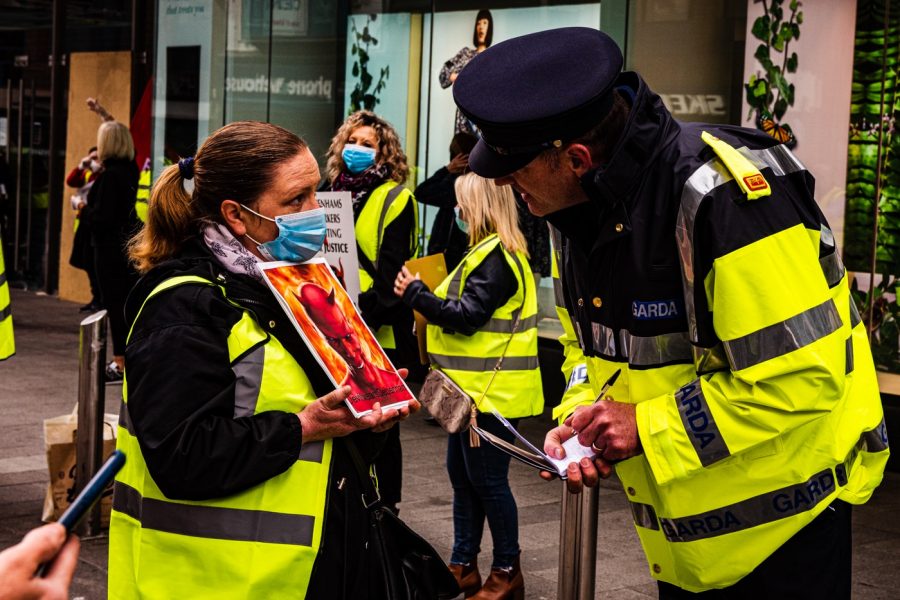
Image: Daniele Idini
Themes of Protests
The themes of the protests are transgender rights, sex education at schools, immigration, corruption, and criminalizing offence. A whole phalanx of designer leftist and so-called progressive issues are under attack. These are issues that need to be disentangled, and the rage of the mob understood if not in some situations, in my view, condoned.
Of course we ought to be highly sceptical of agendas underlying this Populism, not least when it is guided by keeping Ireland for the Irish, or that Irish lives matter. This is a nasty echo of the exclusionary racism and division of our time such that one cannot say all lives matter without generating offence. The extremist reaction in response is to say that non-national life should matter less and can even be destroyed. Sadly, it seems, the moderate, inquiring centre ground has been lost.
The question of sex education at school interacts with religious mullahs and those who enforce dogmatism. But it was nonetheless ridiculous to attempt, essentially, to no platform someone of William Binchy’s intellectual stature – however misguided he may be in my view – disqualifying him from talking about euthanasia because he is a white privileged male further fuels the fire.
Moreover, it is unarguable that the transgender lobby are ludicrously over-represented in the media and dedicated to no platforming.
Clearly, the Dublin Protest on the 23rd became nasty and racist after a social media sensation attributed blame to a non-national for a brutal attack produced a flash mob. Unsurprisingly, the protesters ignored how a Brazilian delivery rider had given the victim a chance of life, in a proportionate defence, acting as the good Samaritan.
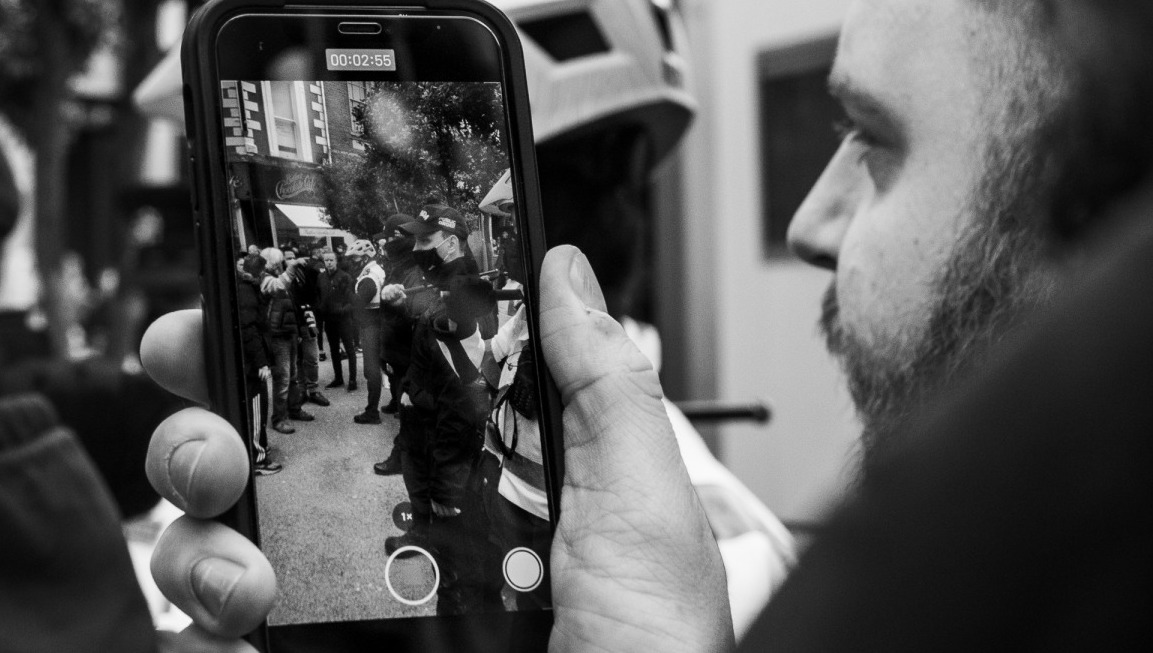
Image: Daniele Idini
Understanding Hatred
It is time to rid ourselves of Irish exceptionalism and investigate the gorgon’s head. To condemn at one level is to fail to understand. The indignation is the product and the cause of others.
Let us deal first with the right to protest, as I envisage a new set of laws being promulgated to regulate this. Certainly, the Gardai now need to deal with a situation of extremism spiralling out of control with increased presence on the ground. But now many are calling for them to be equipped with tasers which are useless at preventing a riot such as we saw in Dublin.
The current Minister for Justice Helen McEntee TD previously obtained a High Court order from Justice Owens requiring telecommunications service providers to retain certain data – including user, traffic and location data – for a period of twelve months, for the purpose of safeguarding the security of the State.
Those in power ought to consider Paul Lynch’s Booker Prize winning novel, Prophet Song, a dystopian vision of an Ireland of the near future, which describes:
The dark pouring of the riot police, the rattling staccato of live rounds fired above protesters heads … the slow-motion collapse of the body torn into pixels as it is consumed by tear gas.
Article 11 of the European Convention of Human Rights provides for freedom of assembly. This means that every individual, regardless of cause, has the right to protest, march or demonstrate in a public space. Historically the police had a duty to refrain from restricting this right unnecessarily and a positive obligation to take measures to protect peaceful protests. It was also the case that any intervention had to be necessary, proportionate and for one of the following aims:
- In the interest of national security or public safety
– to prevent disorder or crime.
OR
- To protect health or morals – to protect others’ rights.
Freedom of assembly is also guaranteed under the much-denuded Article 40.4 of the Irish Constitution.
In the famous Irish common law ‘orange lily’ case Humphries v Connor, 1864 plucking an orange order lily from a woman in the nationalist area of Belfast was adjudged to be a justifiable police act and a regulation of protest, as this would likely cause a breach of the peace. In these situations, historically, the police may take reasonable steps, including arrest, to prevent or stop a breach of the peace intended to cause harassment, alarm, or distress. The authorities already enjoy sundry other powers about rerouting matches, such as in the Love Ulster situation.
The Dublin riot should not be used as an excuse to introduce new powers that will have little or no affect on preventing disorder on the streets.
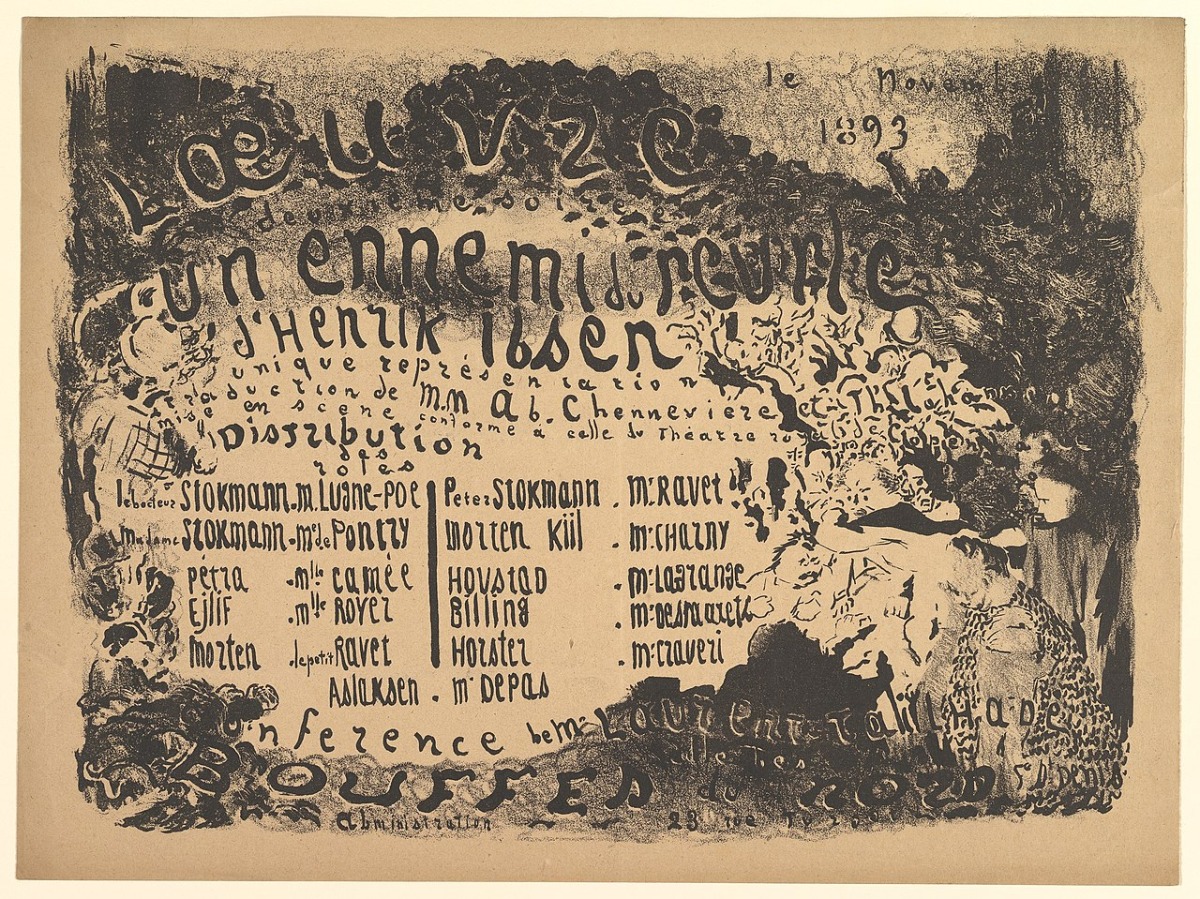
Édouard Vuillard, An Enemy of the People program for Théâtre de l’Œuvre, November 1893
Corruption
One interesting aspect of the allegations made by far right protestors is that our ruling classes is irredeemably corrupt, a view which aligns with left-wing, even Marxist, critiques of crony capitalism.
Although Henrik Ibsen was not an overtly political writer his An Enemy of The People (1882) explores a moral question pertinent to our times. In that play a prominent and well-connected engineer, whose brother is the town mayor, is asked to conduct a survey of the waters of a town which has become famous as a spa resort, attracting a great deal of tourism. When he tests the waters, however, he finds that they are polluted. He informs the town burghers and indeed his brother. In essence, he protests.
Rather than lauding him and complimenting him for a finely attuned sense of ethics and professional analysis, they turn on him with ever-increasing ferocity. He is told that he will destroy the local economy. He is named and shamed. His family is torn apart, and he becomes an enemy of the people.
This was also the fate of Jonathan Sugarman and Garda Maurice McCabe, among others, who have exposed serious wrongdoing in the Irish state. Interestingly, the arrests of those who speak out is also evident in Paul Lynch’s novel.
For Leo Varadkar to say that anyone involved in civil disobedience or protest requires disproportionate sanction is to fail to understand the right in question.
Jurgen Habermas, the greatest living intellectual on the planet, argues for the vital importance of civil disobedience in vitalizing a democracy. The question of civil disobedience has a long history. One of the first exponents was Antigone, who went against the will of the autocratic King Creon in Sophocles’s play in 430 BC, invoking a distinction between positive law and the law of God.
The right to civil disobedience has never featured prominently in Catholic theology and philosophy, as civil disobedience tends to be sacrificed on the altar of order publique. As Catholicism recedes in Ireland we are witnessing the advent of a new corporate theocracy imposing its own order publique.
But the right to disobey against tyranny is important, as Locke argued; Foucault also chastised what many writers have termed blind obedience, as did Hannah Arendt.
An intolerance of dissent is an increasingly feature of our age. In a recent book by Frédéric Gros Disobey! The Philosophy of Resistance (2021) the question of surplus obedience is canvassed. This is a surplus to requirements where one obeys for the rewards or pledges, assumed promises and out of a visceral sense of gratitude. This is what is called anticipatory obedience.
Leo Varadkar ought to recognise that not all protest is comfortable or right, but it is irrelevant at one level if the protester is misguided; he or she ought to retain a right to be a nuisance.
Towards the end of his career Ronald Dworkin wrote an article on the right to ridicule. Perhaps we should also emphasis the right to be a nuisance: for holding awkward opinions.
It should be stressed that the control of protest is also intimately related to the control of dissent. Thus, the dissident or conscientious objector is prosecuted as a deviation from an oppressive norm. Sakharov is imprisoned by the Communist state subversives. Religious mullahs prosecute Salman Rushdie. Thought censorship rules.
Anyone has a right to be a nuisance or a gadfly in a participatory democracy.
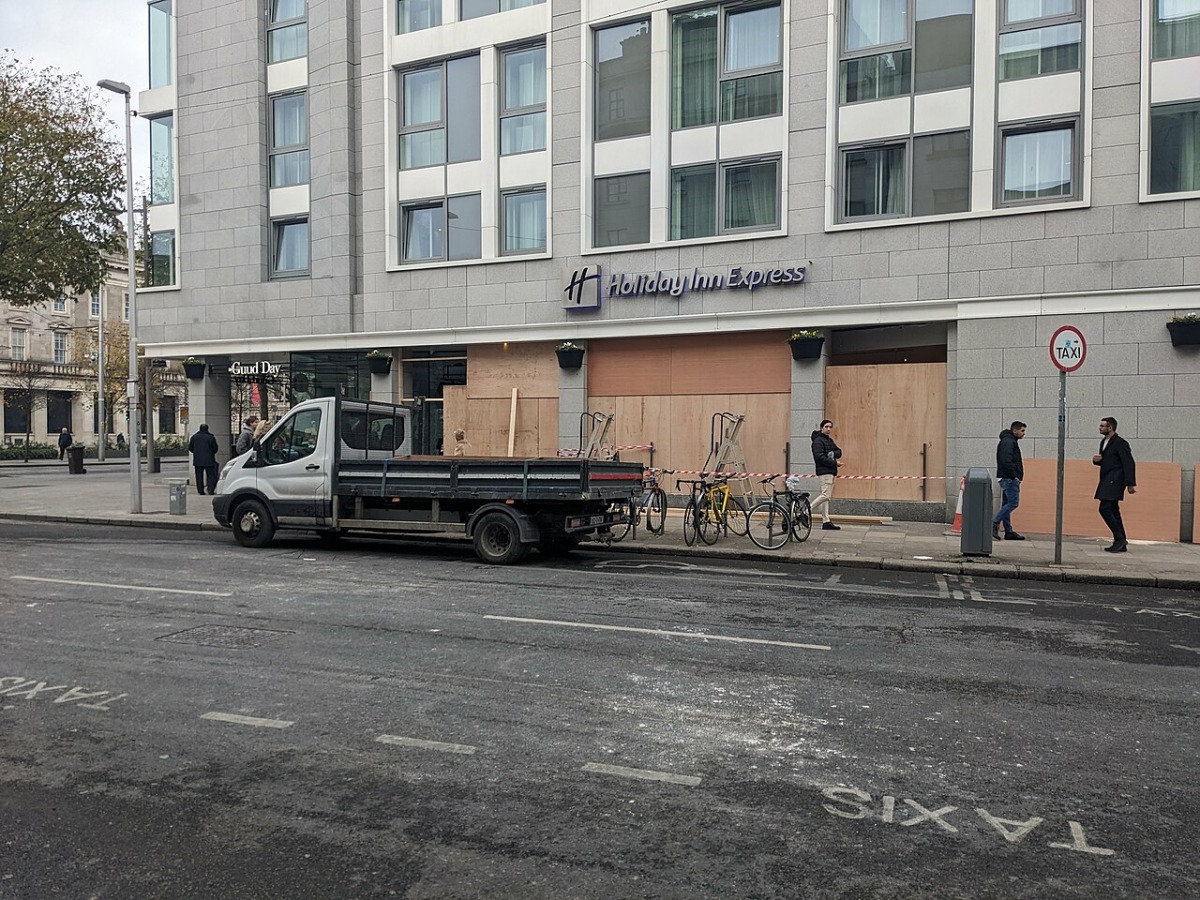
The Holiday Inn Express hotel in the aftermath.
Protection Against Hatred
The Gardaí enjoy the right and should be empowered to protect against hatred. If rioters spread hatred against transgender people, then the protest should be stopped, and they should be prosecuted. The same applies if they spread hatred and racism against immigrants. I am talking about thuggish racist behaviour.
There may be a legitimate argument that an indigenous community is being displaced, and even being rendered homeless. But this does not condone anarchical jihadism. The Irish government are to be commended, to some extent, for protecting refugees in temporary accommodation, but not for negating affordable housing and embedding corruption. People have a right to affordable housing and a decent quality of life in a state. The cost of housing associated with the presence of vulture and cuckoo funds fosters hatred in Ireland.
Through neoliberal policies and increasing state authoritarianism, the ruling parties have fostered far right Populism. In my view in moral terms there is little to distinguish many of the police enforcers from the protestors. You cannot claim the moral high ground to condemn unless you understand blame and responsibility.
Thus, in general, in what remains of our democracy, protest rights should be protected. People ought to have a right to say, peacefully, ‘I disagree’ with the government’s immigration policies, but without spreading hatred towards minorities, or attacking innocent bystanders.
The state has facilitated this promethean storm. The mob subscribes to fascists ideas, but it is within the architecture of the state security apparatus that fascism tends to emerge. Our government may not be overtly racist, but indifference to poverty and social exclusion has caused many problems and contributed to racism.
The police should not be granted any further powers than they already enjoy, instead the government ought to alleviate the social conditions that breed hatred. We in fact need another New Deal and not another fictional or real latter-day Charles Lindberg leading us to Populist fascism as we find in Philip Roths fictional recreation of the 30’s The Plot Against America. It seems to me that the Plot Against Ireland is the twenty-four-hour mass surveillance.

